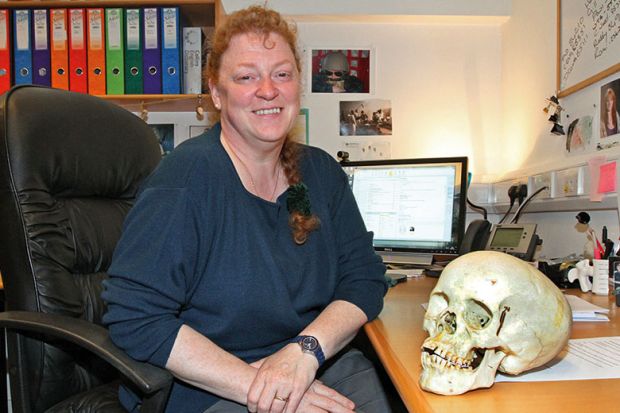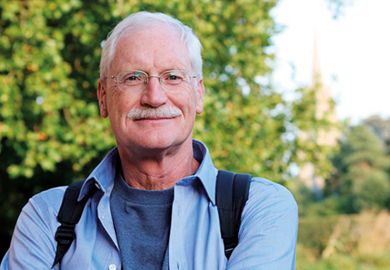Dame Sue Black, an internationally renowned forensic anthropologist, is director of the Centre for Anatomy and Human Identification and co-director of the Leverhulme Research Centre for Forensic Science at the University of Dundee. Her forensic expertise has been crucial in a number of high-profile criminal cases, including the conviction of Scotland’s largest paedophile ring in 2009 and, more recently, the conviction of one of the UK’s most notorious paedophiles. In 2016, she was awarded a damehood in the Queen’s Birthday Honours and in March was named one of the Saltire Society’s ‘Outstanding Women of Scotland’ for 2017.
Where and when were you born?
Inverness, May 1961, on a Clootie Well Sunday [a day of pilgrimage to a wishing well].
How has this shaped you?
My very young formative years were spent on the west coast of Scotland in a hamlet called Stromeferry. There were only 12 children in my primary school. It taught me about the beauty of solitude and the importance of silence. It reminds me that it doesn’t matter where you start, it is the road travelled and the final destination that matter.
What were your immediate reactions to being recognised by the Saltire Society?
I am deeply patriotic and so it was a huge honour that went straight to my heart.
Where does this honour sit in your list of accolades?
It matters [the] most to me because it represents what Scotland thinks of what I have tried to do with my life, and I can think of no other place in the world where I would rather live.
How does it feel to be placed alongside the First Minister, J.K. Rowling and other household names?
A bit ludicrous, really. But heigh-ho, I’ll take it!
The University of Dundee’s website says that you ‘live to work and when I have spare time – I fill it with work’. Is this still the case?
I have a complete work-life imbalance – but that is my choice. My parents gave me a fearsome Scottish Presbyterian work ethic and, given that my job is what I have always wanted to do, it isn’t really like working at all. I feel anxious when I don’t have a long list of things to do and, when [the list] looks like it is running towards empty, I generate more ideas. Colleagues in my department groan audibly when I say “I’ve had an idea”. I think that we are a very long time dead, so we need to fill every single day as if it was our last. It has become a familiar descriptor for many academics, but then they have always been driven people who won’t march to a tune set by others.
Your academic work has involved you in some traumatic circumstances. Does it take a lot to separate what you are doing from any emotions that you may be feeling?
Practitioners in our field are somewhat desensitised to the enormity of the human suffering that we witness almost on a daily basis. We have to be if we want to do our job effectively as objective scientists. Some work is emotionally harder than others but, at the end of the day, we are there to serve justice and we are of little help if we become emotionally attached to a prejudged outcome.
What is the biggest misconception about your field of study?
That we just deal with the dead. A lot of our work is about identification of the living – victims and perpetrators.
Scotland and the Scottish academy have been particularly strident about support for international students. Do you worry for the diversity in the UK’s higher education landscape if student/staff mobility is affected by the Brexit negotiations?
I do worry deeply for our equality and our diversity. In the [Scottish independence] referendum, we saw some truly disgraceful behaviour and diabolical rhetoric – all in the alleged name of Scotland’s independence. We are a welcoming nation, a safe nation and a caring nation – we forget that at our peril and risk losing our core identity if we kowtow to the parochial scaremongers.
What are the best and worst things about being an academic?
The best thing is our students, who don’t look at life through our fractured lens, which is invigorating. The worst thing is students who are simply going through the motions of learning rather than “living” the opportunity.
If you weren’t an academic, what do you think you’d be doing?
I think that I would probably be a non-fiction writer. I love the isolation of writing.
What is the worst thing that anyone has ever said about your academic work?
My PhD supervisor told me that I worked very hard but wasn’t very bright. No alleged “mentor” has the right to say such a thing to an impressionable young person.
What advice would you give to your younger self?
Stop worrying about the things that don’t matter. Scrape them off your shoe and keep forging your own path.
What kind of undergraduate were you?
Scared and overwhelmed.
Do you live by any motto or philosophy?
It was laid down for me by my grandmother. Look at yourself squarely in the mirror and if you can meet your own gaze with an unwavering clear conscience, then you are probably doing your best.
What saddens you?
Abuse of the most vulnerable in society – young, old and those who cannot fend for themselves.
What would you like to be remembered for?
Caring.
john.elmes@timeshighereducation.com
Appointments
Alison Goodrum has been appointed research director at Norwich University of the Arts. Professor Goodrum joins from the University of Huddersfield, where she was professor of fashion. In her new role, she will be responsible for developing NUA’s research strategy, chairing the university’s research committee and leading it into the next research excellence framework. “Norwich University of the Arts has an outstanding reputation as a centre for innovation in art, design and media,” Professor Goodrum said. “It’s a privilege to join its vibrant and talented community in the role of director of research and I am looking forward to building on its rich traditions and expertise.”
Wendell Pritchett has been named the University of Pennsylvania’s 30th provost. Professor Pritchett, presidential professor of law and education in the university’s Law School, takes over on 1 July. He was previously interim dean of Penn Law in 2014-15. Between 2009 and 2014, Professor Pritchett served as chancellor of Rutgers University-Camden, one of the three regional campuses of Rutgers, the State University of New Jersey. In 2012, he was elected president of the Coalition of Urban and Metropolitan Universities, a national consortium of higher education institutions. “As a lifelong Philadelphian, I cannot remember a time that the University of Pennsylvania was not part of my life,” he said. “I look forward to working with...everyone in this amazing community to continue to advance our institution to even greater heights.”
Sir Martin Narey has joined Manchester Metropolitan University as a visiting professor in its Policy Evaluation and Research Unit.
Catherine Schenk, professor of international economic history at the University of Glasgow, has been appointed to the professorship of economic and social history at the University of Oxford from September.
Scottish human rights lawyer Aamer Anwar has been formally installed as rector of the University of Glasgow.
Register to continue
Why register?
- Registration is free and only takes a moment
- Once registered, you can read 3 articles a month
- Sign up for our newsletter
Subscribe
Or subscribe for unlimited access to:
- Unlimited access to news, views, insights & reviews
- Digital editions
- Digital access to THE’s university and college rankings analysis
Already registered or a current subscriber?







